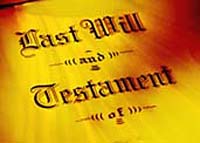 Estate taxes are seen by some as instruments of public policy, an attempt to fight economic inequality by diminishing the ability of wealthy families to aggregate vast amounts of wealth. Others see estate taxes as a “death tax” that penalizes those who are financially successful. Whatever your opinion, estate tax rates are still quite high compared to other taxes. This creates an incentive to plan in advance and use sophisticated methods to reduce estates taxes.
Estate taxes are seen by some as instruments of public policy, an attempt to fight economic inequality by diminishing the ability of wealthy families to aggregate vast amounts of wealth. Others see estate taxes as a “death tax” that penalizes those who are financially successful. Whatever your opinion, estate tax rates are still quite high compared to other taxes. This creates an incentive to plan in advance and use sophisticated methods to reduce estates taxes.
Thirteen different brackets might make you think that estate tax planning is all about college basketball! According to a Fox Business article, “2015 Estate Tax Rates: How Much Will You Pay?” the rate structure for the estate tax has remained virtually unchanged since 2013, even with these numerous brackets. See the chart below for a birds-eye-view of the 13 different brackets:
|
Amount of Taxable Estate
|
Tax Bracket
|
|
$0-$10,000
|
18%
|
|
$10,001-$20,000
|
20%
|
|
$20,001-$40,000
|
22%
|
|
$40,001-$60,000
|
24%
|
|
$60,001-$80,000
|
26%
|
|
$80,001-$100,000
|
28%
|
|
$100,001-$150,000
|
30%
|
|
$150,001-$250,000
|
32%
|
|
$250,001-$500,000
|
34%
|
|
$500,001-$750,000
|
37%
|
|
$750,001-$1 million
|
39%
|
|
Over $1 million
|
40%
|
Source: IRS
Before you do any number crunching, remember that the federal government has an estate tax exemption for all estates more than $5.43 million (in 2015). The “lifetime exemption amount” is the cut-off mark for how much wealth each person can pass to their heirs without owing any estate tax.
The article explains that the exemption is different than a standard deduction. What you do is look at all your taxable estate assets and knock out the first $5.43 million. If you have more than that, the estate tax will be at the maximum rate of 40 percent on the portion of the estate that’s above the $5.43 million threshold. For instance, if your estate is $5.44 million, then your estate's tax liability would be $4,000 — which is 40 percent of the $10,000 above the $5.43 million threshold.
An estate planning attorney can help you with some ways to reduce or even eliminate your estate tax liability. This can include gifts during your lifetime to reduce your estate assets at your death. The law says that you can give an individual up to $14,000 annually without having to pay any gift tax. If you give more than that amount, you'll start using up your lifetime exemption. You don’t want that!
There are also many more-complicated methods of giving money to potential heirs during your lifetime that can reduce your eventual estate tax bill. Talk with your estate planning attorney about these more complex strategies and leave more money for your heirs and less for taxes.
For additional information on estate tax planning and elder law topics in Houston, please click here to visit my website.
Reference: Fox Business (July 16, 2015) “2015 Estate Tax Rates: How Much Will You Pay?”
 Our nation’s estate tax celebrates the hundred year mark in 2015. The often controversial estate tax stands to gain even more attention as the 2016 Presidential election draws near.
Our nation’s estate tax celebrates the hundred year mark in 2015. The often controversial estate tax stands to gain even more attention as the 2016 Presidential election draws near.  Houston Estate Planning and Elder Law Attorney Blog
Houston Estate Planning and Elder Law Attorney Blog










